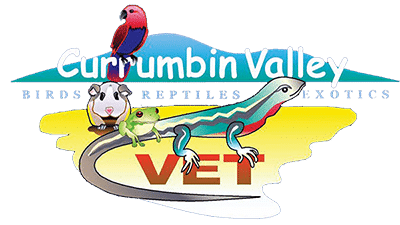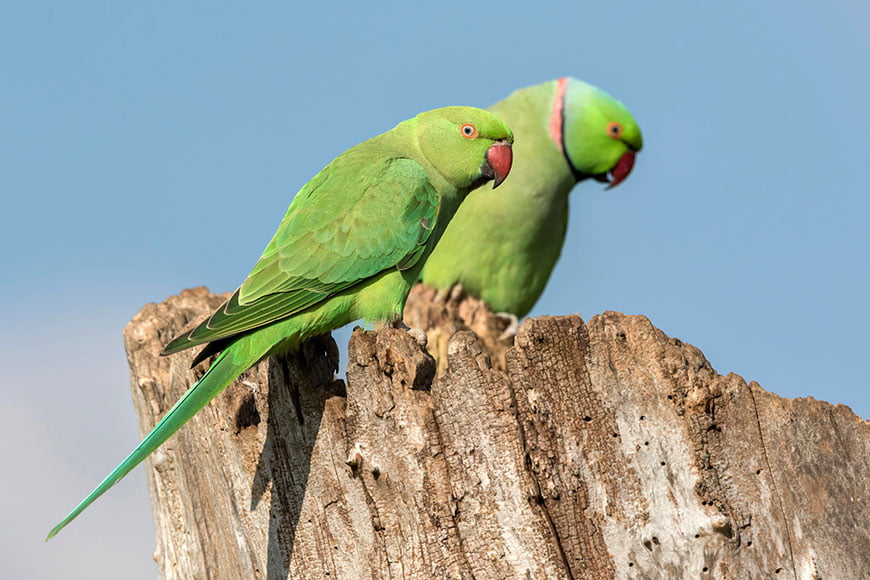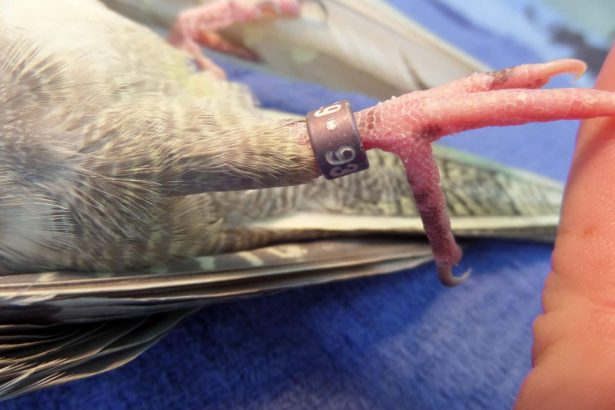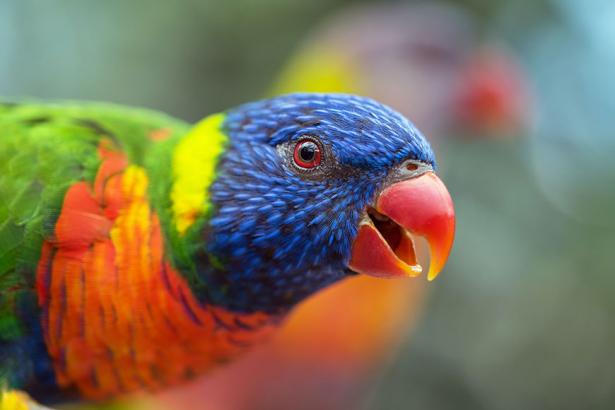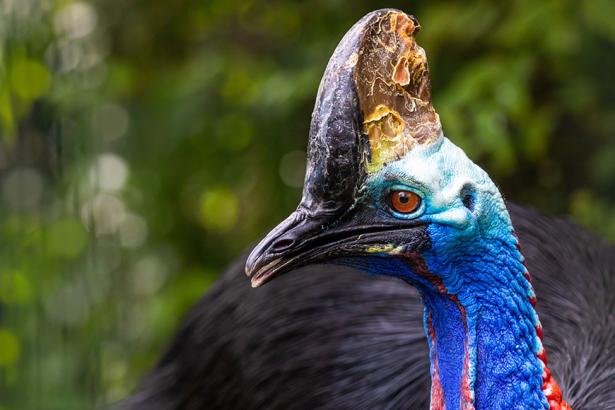Indian ringneck parrots are fascinating creatures, known for their beauty and intelligence. They make fantastic pets for those willing to invest the time and effort into their care. In this article, we will cover everything you need to know about keeping Indian ringnecks as pets, from their diet and size to their training and behaviour.
Indian Ringneck Diet and Food
A well-balanced Indian ringneck diet is essential for keeping your feathered friend healthy and happy. Here are some key points to keep in mind when it comes to Indian ringneck food:
- Offer a variety of fresh fruits and vegetables daily. Some favourites include apples, grapes, carrots, and leafy greens.
- Pellets should make up about 60-70% of their diet. Look for ringneck parrot food specifically formulated for parrots or parakeets.
- Seeds can be included as a treat, but should not make up the majority of their diet, as they are high in fat and low in essential nutrients.
- Make sure to provide fresh water every day, and avoid giving your bird any foods that are toxic to them, such as chocolate, or avocado.
For more information on food for ringnecks and a comprehensive Indian ringneck food list, consult with your avian veterinarian.
Indian Ringneck Care and Housing
Taking care of an Indian ringneck parakeet requires attention to detail and a commitment to their well-being. Here are some important aspects of Indian ringneck care to consider:
- Indian ringneck size: These parrots are medium-sized birds, typically measuring around 16 inches in length, including their long tail feathers. They require a spacious cage to accommodate their size and energy levels.
- Indian ringneck cage: Choose a cage that is at least 36 inches tall, 24 inches wide, and 24 inches deep. Make sure the bars are spaced no more than 3/4 inch apart to prevent your bird from getting stuck or escaping.
- Provide natural perches: Make sure they have perches of varying sizes that would occur naturally, as well as toys to stimulate their curious minds that aren’t made of plastics or other materials that are harmful.
- Clean their cage regularly: It’s imperative to consistently clean your ringneck’s enclosure and provide a shallow dish or birdbath for them to bathe in.
Ringneck Parrots: Lifespan and Behavior
When considering an Indian ringneck as pets, it’s essential to understand their lifespan and behaviour. Some important facts include:
- Ringneck parrot lifespan: These birds have a relatively long lifespan, often living 25-30 years with proper care. This means that adopting an Indian Ringneck is a long-term commitment.
- Indian ringneck parrot behaviour: These intelligent birds are known for their ability to mimic human speech and can be quite talkative when they choose to be. However, they can also be independent and may not always want to interact with their owners.
Training Your Indian Ringneck Parrot
Proper Indian ringneck training can help strengthen the bond between you and your pet, as well as minimise undesirable behaviours.
Some tips for Indian ringneck parrot training:
- Start training sessions when your bird is young and more receptive to learning.
- Use positive reinforcement, such as praise or treats, to encourage desired behaviours.
- Keep training sessions short and focused to prevent your bird from becoming bored or overwhelmed.
- Be patient and consistent in your training efforts.
Remember that Indian ringneck parrot behaviour can vary between individuals, so it’s important to be patient and adapt your training methods to suit your bird’s unique personality. Before you decide to bring one of these stunning parrots into your life, make sure to research ringneck bird food, their habitat requirements, and any potential health concerns.
Indian Ringneck Parrot Enrichment
One essential aspect of keeping an Indian Ringneck Parrot happy and healthy is providing them with plenty of enrichment opportunities. Here are some ideas to keep your bird engaged and stimulated:
- Rotate toys regularly: You want to maintain their interest. Offer a variety of toys, such as puzzles, foraging toys, and chewable toys made from bird-safe materials or those that occur naturally.
- Encourage natural behaviours: There are important aspects to their lives such as foraging. It’s in their nature.
- Bird food for Indian ringnecks: You can even encourage their foraging behaviour hiding healthy treats in toys or around their cage.
- Provide opportunities for socialisation: This is very important both with you and other birds if possible. Remember that each bird’s social needs will vary, and some may prefer more or less interaction.
Health and Wellness for Your Indian Ringneck Parrot
Maintaining the health of your Indian ringneck parrot is crucial for a long and happy life. Be sure to:
- Schedule regular veterinary check-ups with an avian vet to monitor your bird’s health and address any concerns.
- Keep an eye out for signs of illness or distress, such as changes in appetite, behaviour, or droppings. Early intervention can make a significant difference in your bird’s recovery.
- Provide a balanced and nutritious diet to support their overall health, including ringneck food that meets their specific nutritional needs.
Bonding with Your Indian Ringneck Parrot
Building trust and establishing a strong bond with your Indian Ringneck Parrot is crucial for a fulfilling relationship on both ends. Spend time with your parrot every day, even if it’s just sitting near their cage and talking to them softly. This helps them get used to your presence and voice.
Offer treats, such as a piece of fruit, a favourite ringneck food, from your hand to encourage interaction and trust. Be patient and move at your bird’s pace. It may take time for your Indian Ringneck to become comfortable with you, but consistent and gentle interactions will help build trust.
Indian Ringneck Parrot Molting and Feather Care
Proper feather care is an important aspect of Indian ringneck care. Like all birds, Indian Ringnecks go through a moulting process, during which they shed old feathers and grow new ones.
Moulting typically occurs once or twice a year and can last several weeks. During the moulting process, your bird may become more irritable and less interested in interacting with you. Be patient and give them space during this time.
Offer a balanced diet, including fruits, vegetables, and pellets, to support healthy feather growth.
Travelling with Your Indian Ringneck Parrot
Travelling with birds in general is discouraged. They are not like dogs or cats and travel causes unnecessary stress on your feathered companion. If you have no other choice but to travel with your Indian ringneck parrot, there are a few things to consider to ensure a safe and stress-free journey:
- Invest in a sturdy, appropriately-sized travel cage for your bird. Make sure it has proper ventilation and enough room for them to move around comfortably.
- Bring a supply of their favourite ringneck parrot food and water to keep them nourished and hydrated during the trip.
- Plan your route and accommodations ahead of time, making sure that your chosen lodgings are pet-friendly and prepared to accommodate birds.
- Monitor your bird’s behaviour and stress levels during the journey. If they show signs of distress, take the time to calm and reassure them.
Parting Notes
Adopting an Indian ringneck parrot as a pet can be a rewarding and enjoyable experience. By understanding their dietary needs, housing requirements, and providing adequate care and training, you can build a strong bond with your feathered friend. Remember to be patient, consistent, and attentive to their needs, and you will enjoy a long-lasting and fulfilling relationship with your Indian ringneck parrot.
We have a number of articles for you to read that will help you better understand your pet and we hope this one helps! Check back for more information on how to give your animal its best life, they will love you for it!
FAQs
The ideal Indian ringneck diet consists of a balanced combination of pellets (making up about 60-70% of their diet), fresh fruits, vegetables, and a small amount of seeds as treats. Be sure to provide fresh water daily and avoid feeding your bird any toxic foods such as avocado.
Choose a spacious enclosure (at a bare minimum of 90 cm tall, 60 cm wide, and 60 cm deep) with bars spaced no more than 2 cm apart. Provide perches of varying sizes and materials, offer a variety of toys for mental stimulation, and maintain a clean environment with regular cage cleaning.
Successful Indian ringneck parrot training involves starting when your bird is young, using positive reinforcement to encourage desired behaviours, keeping training sessions short, focused, and being patient and consistent in your efforts.
